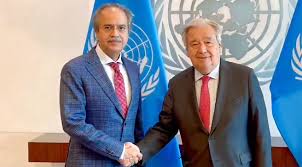Pakistan urges UNSC to address root causes of conflict for sustainable peace

Celina Ali
Islamabad: Pakistan has called for decisive global action at the United Nations Security Council (UNSC) to address the underlying root causes of conflict, emphasizing that sustainable peace can only be achieved by tackling issues such as poverty, underdevelopment, and the denial of fundamental rights.
Delivering a national statement during the UNSC’s Open Debate on “Poverty, Under-development and Conflict: Implications for the Maintenance of International Peace and Security,” Pakistan’s Permanent Representative to the UN, Ambassador Asim Iftikhar Ahmad, asserted that these factors are not merely development concerns but are, in fact, “among the deep-rooted structural causes of conflict.”
Ambassador Ahmad stressed that without directly addressing these underlying drivers, any peace efforts will inevitably remain “incomplete, fragile and short-lived.” His remarks align with a growing international consensus that sustained peace requires comprehensive strategies that go beyond immediate conflict resolution to tackle the socioeconomic and political grievances that fuel instability.

The open debate, which also heard from UN Secretary-General António Guterres and other senior UN officials, underscored the stark reality that a significant number of the world’s poorest countries are currently embroiled in conflict. The Secretary-General highlighted that if current trends continue, two-thirds of the world’s poor will live in conflict-affected or fragile states by 2030, reinforcing the urgent need for integrated development and peacebuilding efforts.
Pakistan has consistently advocated for a holistic approach to peace and security, often emphasizing the principle of addressing root causes in its diplomatic engagements. This statement at the UNSC further solidifies Pakistan’s stance that equitable development, justice, and respect for human rights are indispensable for building lasting peace and preventing conflicts.





